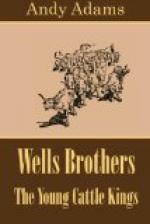The beef herd camped for the night on the divide. Joel’s report provoked argument, and a buzz of friendly contention, as the men lounged around the tiny camp-fire, ran through the outfit.
“It may be the custom among you Texans,” protested one of the lads from the Republican, “but I wouldn’t buy a herd of cattle without seeing them. Buy three thousand head of cattle unseen? Not this one of old man Vivian’s boys! Oh, no!”
“Link, that kind of talk shows your raising,” replied Sargent. “Your view is narrow and illiberal. You haven’t traveled far. Your tickets cost somewhere between four and six bits.”
Manly lifted his head from a saddle, and turning on his side, gazed at the dying fire. “Vivian,” said he, “it all depends on how your folks bring you up. Down home we buy and sell by ages. A cow is a cow, a steer is a steer, according to his age, and so on down to the end of the alphabet. The cattle never misrepresent and there’s no occasion for seeing them. If you are laboring under the idea that my old man would use any deception to sell a herd, you have another guess coming. He’d rather lose his right hand than to misrepresent the color of a cow. He’s as jealous of his cattle as a miller is of his flour. These boys are his customers, last fall, this summer, and possibly for years to come. If he wanted them, Joel did perfectly right to buy the cattle unseen.”
The second train of Lazy H beeves reached the railroad on schedule time. The shipper was in waiting, cattle cars filled the side track, and an engine and crew could be summoned on a few hours’ notice. If corralled the night before, passing trains were liable to excite the beeves, and thereafter it became the usual custom to hold outside and safely distant.
The importance of restocking the range hurried the shipping operations. Instead of allowing the wagon to reach the station, at sunrise on the morning of shipping, it and the remuda were started homeward.
“We’ll gather beeves on the lower end of our range to-morrow,” said Joel to the cook and wrangler, “and there’s no need to touch at headquarters. Follow the trail to the old crossing, and make camp at the lower tank—same camp-ground as the first shipment of Lazy H’s. The rest of the outfit will follow, once these cattle are loaded out. You might have a late supper awaiting us—about ten o’clock to-night.”
The gates closed on the beeves without mishap. They were cut into car lots, from horseback, and on the arrival of the crew, the loading began. A short hour’s work saw the cattle aboard, when the dusty horsemen mounted and clattered into the straggling hamlet.
The homeward trip was like a picnic. The outfit halted on the first running water, and saddle pockets disgorged a bountiful lunch. The horses rolled, grazed the noon hours through, and again took up their former road gait. An evening halt was made on the Prairie Dog, where an hour’s grazing was again allowed, the time being wholly devoted to looking into the future.




